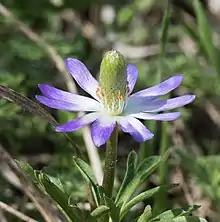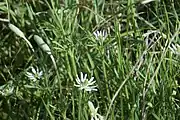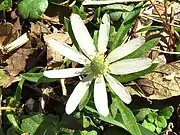Anemone berlandieri
Anemone berlandieri, commonly known as tenpetal thimbleweed or tenpetal anemone, is a rhizomatous perennial flowering plant in the buttercup family Ranunculaceae.[1] It is native to much of the Southern United States, where it flowers in the late winter and spring, between February and April. The specific epithet berlandieri honors Jean-Louis Berlandier (1803–1851), a botanist who explored Texas and Mexico in the nineteenth century.[2]
| Anemone berlandieri | |
|---|---|
 | |
| Purple flower in Denton County, Texas | |
| Scientific classification | |
| Kingdom: | Plantae |
| Clade: | Tracheophytes |
| Clade: | Angiosperms |
| Clade: | Eudicots |
| Order: | Ranunculales |
| Family: | Ranunculaceae |
| Genus: | Anemone |
| Species: | A. berlandieri |
| Binomial name | |
| Anemone berlandieri Pritz. | |
| Synonyms | |
| |
Distribution
Anemone berlandieri is native to much of the Southern United States, from Texas to Florida. It ranges as far north as Kansas, and as far south as northeast Mexico. There is also an isolated population in the southern Appalachian Mountains.[1][3] It grows in sunny open areas, such as prairies and hillsides, and in wooded areas over a thin shale substrate.[4]
 Flowers and flower buds in Williamson County, Texas
Flowers and flower buds in Williamson County, Texas Growing in a lawn in Dallas County, Texas
Growing in a lawn in Dallas County, Texas
References
- "Anemone berlandieri Pritz.". Plants of the World Online. Royal Botanic Gardens, Kew. Retrieved 13 December 2020.
- Gledhill, David (2008). The Names of Plants (4th ed.). Cambridge University Press. p. 69. ISBN 978-0-521-86645-3.
- " Anemone berlandieri". County-level distribution map from the North American Plant Atlas (NAPA). Biota of North America Program (BONAP). 2014. Retrieved 13 December 2020.
- Utech, Frederick H.; Keener, Carl S.; Ford, Bruce A. (1997). "Anemone berlandieri". In Flora of North America Editorial Committee (ed.). Flora of North America North of Mexico (FNA). 3. New York and Oxford. Retrieved 13 December 2020 – via eFloras.org, Missouri Botanical Garden, St. Louis, MO & Harvard University Herbaria, Cambridge, MA.